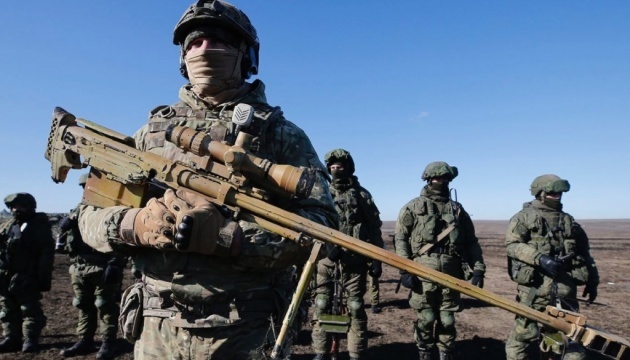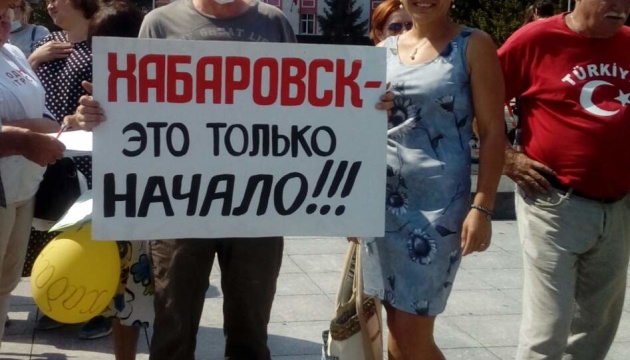
Why Russia is pushing for a new round of aggression against Ukraine
A new wave of destabilization is looming over Ukraine, the one involving internal turbulence in all areas, provoked by outside forces.
Today, the Ukrainian public is concerned over the latest reports of Russia's unusual military activity near the border with Ukraine, while experts are trying to provide more or less adequate assessments of such actions on the part of the Kremlin and answer the question: "Will Vladimir Putin dare to openly invade?"
To address this question, we need to find out, why the escalation is unfolding precisely now. After all, late last year, we all saw certain progress in terms of the promotion of peace initiatives put forward by President Volodymyr Zelensky and discussed the main result, which is saving human lives. So what went wrong?
Until recently, the key issue for Russia and its political establishment has been the issue of political succession, personalities that will take over power once Vladimir Putin steps down. In the end, Putin didn’t quit and the issue was resolved in a rather simple way, through the mechanism of zeroing the count of his presidential terms. However, among the Russian elites, this for some time provoked an escalation of internal confrontation (competition between the so-called "Kremlin towers"), which manifested itself in loads of compromising material. In the wake of public outrage in Russia at the scale of embezzlement of state coffers and arbitrary actions by authorities, the protest movement was gaining momentum in the country (following the poisoning and arrest of opposition’s Alexei Navalny, protests in Khabarovsk, and other local manifestations of public discontent). As a result, in the first half of 2021, Russia, de facto, was going through an actual crisis.

This coincided with foreign policy complications amid Joe Biden’s coming to power in the United States and Russia's expectations that the new U.S. administration's policy toward Russia would become tougher and that the Nord Stream 2 project would face insurmountable difficulties. In search of an "asymmetric response," Vladimir Putin chose saber-rattling that the whole world observed in March-April 2021.
In early June, however, the situation changed as the protest movement in Russia came to naught, Navalny was ultimately “defeated,” and Putin met with Biden in Geneva on June 16. As anxiety levels subsided, the Russian leadership immediately embraced the opportunity to voice the main points of their foreign policy. Op-eds and interviews came out one by one, delivered by Vladimir Putin, Dmitriy Medvedev, Nikolay Patrushev, Sergei Naryshkin, and Sergei Lavrov.
These include the following pieces:
● Vladimir Putin: an op-ed "On the historical unity of Russians and Ukrainians" of July 12, 2021; speech at the plenary session of the Russian Energy Week international forum; interview with CNBC of October 13, 2021; and address to the meeting of the Valdai discussion club of October 21, 2021;
● Dmitry Medvedev: an op-ed "Why contacts with the current Ukrainian leadership are meaningless" of October 11, 2021;
● Sergei Naryshkin: an interview with Dmitriy Solovyov of August 1, 2021, and with Russia Today of September 26, 2021;
● Nikolay Patrushev: an interview with Izvestia of August 19, 2021, the Arguments and Facts weekly: "Chain Reaction of Chaos. On the alliances and values alien to Russia” of September 21, 2021; and
● Sergei Lavrov: an op-ed "On Law, Rights, and Rules" of June 28, 2021, speeches at the VII World Congress of Compatriots of October 15, 2021, and at the Valdai Forum of October 19, 2021; and interview with Russia 24 TV of November 1, 2021.
The core of the Russian approach is the idea of moderate conservatism, voiced by Vladimir Putin at the Valdai event (October 21, 2021), as the most reasonable, in the opinion of the Russian leadership, principle in relations between state actors in the conditions of an ongoing change of world order. In essence, however, such conservatism boils down to the idea of redistributing global influence (as if it were a Yalta Conference 2.0) between world powers in the face of the threat of worldwide chaos. With this approach and taking into account the Russian vision, Ukraine, like any other country of the so-called "post-Soviet space,” unconditionally falls into the zone of Russia’s exclusive influence. In this case, the will of the nations (Ukrainian, Belarusian, or Kazakh) no longer matters because the right to decide for them belongs exclusively to the "powerful actors" who play by the "winners are never judged" principle.
In fact, Russia has already tested this principle in Chechnya and Georgia, as well as by attempting to annex Crimea.
In this idealistic picture of the new world, according to Russia’s perception, Ukraine remains the most irritating factor, which for many years has been an obstacle for Russia to resolve its problems, and because of which, in the Kremlin's interpretation, "Russia's relations with the West have deteriorated." Ukraine's pro-active foreign policy, including on promoting the Crimea Platform initiative, has further contributed to such perception.
So what are the ways that Putin has in mind to remove the "obstacle named Ukraine"?
Russia’s current leadership considers its mission to restore the territory of "historical Russia," at least within its core, as seen by Aleksandr Solzhenitsyn ("Rebuilding Russia "), to build up the Russian super-ethnos within Lev Gumilev’s passionarity theory, to ensure the dominance of Russophilia and messianism of the Great Russian nation as per the vision of Nikolay Berdyaev ("The Fate of Russia") and Ivan Ilyin.
We saw the existentialism of this approach preached by the current Russian government as they put forward the "Crimea is ours" narrative and the subsequent artificial fueling of "euphoria" among Russian audiences over the figure of "restorer of Russian lands."
Putin is aging and his time is running out, while Russia's resources are not limitless. Therefore the moment is approaching when Moscow may put the issue forward the hard way: "It’s now or never."
In this context, Berdyaev's quote about the war is rather noteworthy: “War can bring great benefits to Russia, not only material, but also spiritual ones. It awakens a deep sense of national unity, overcomes internal strife and enmity, minor spats of the parties, and reveals the face of Russia, forging a courageous spirit. War exposes the lies of life, sheds veils, and overthrows false shrines. It is a great exposer."
An additional incentive for the Kremlin to be more pro-active on the Ukrainian front is the need to immediately shift the focus of the domestic audience from discussing their country’s failures in tackling the coronavirus pandemic (which results in the Russian government losing electoral support and international respect) toward discussing Russia's foreign policy success stories.
That is why a new wave of destabilization is looming over Ukraine, or more precisely, a wave of externally provoked internal turbulence in all areas.
It will include the following:
► Energy crisis with all of its elements. Russia is already gradually curbing Ukraine's gas transit potential, narrowing the possibility of reverse gas supplies to Ukraine and blocking the country’s access to alternative sources of fuel. Since November, Moscow has been hindering thermal coal exports to Ukraine and, under trumped-up pretexts, also blocking coal supplies from Kazakhstan (by failing to provide the required rail cars or dismantling trains, etc.). The Kremlin has allowed electricity supplies from Belarus, albeit in small volumes, and at the most critical moment they could orchestrate blackouts and scattered power outages;
► Anti-vaccination protests. Already today, across social networks, government-controlled media, and agents of influence, Russian intelligence agencies are trying to undermine people’s confidence in vaccination, while reporting the efforts undertaken by the Ukrainian authorities in the fight against the pandemic as an attack on human rights, calling for masses to demand restriction lifts through protest;
► Large-scale campaigns to compromise the Ukrainian authorities on various charges: of becoming fully controlled by the West, being involved in corruption schemes, and even some officials being assets of the Russian intelligence agencies;
► Incitement of right-wing radical forces to actively fight (including through street protest and riots) against the so-called "internal occupation" (mass speculation on current internal issues, positioning them as a result of the Ukrainian government’s incompetence and neglect of national interests), as well as fueling hysteria around the allegedly inevitable coup d'etat that may hit Ukraine in the first half of 2022;
► Use of military force. The Russian Armed Forces are most likely to be involved once the general picture of total destabilization has been created and the processes of Ukraine’s fragmentation have been launched. On the other hand, constant military maneuvers near the borders of Ukraine and the threat of offensive operations (local or large-scale, including through the territory of Belarus) are gradually becoming an instrument of maintaining constant tension and anxiety in Ukraine. At the same time, the line between blackmail, the threat of an offensive and real preparation for it is being blurred, while a pretext for military aggression could be found at any moment;
► Manipulation of the security situation on the line of contact (by exercising effective control of the 1st and 2nd army corps, the Russian side has a whole arsenal of mechanisms to also control the level of escalation). At the same time, Russia has been artificially fueling the conflict in eastern Ukraine by supplying weapons, financing the occupation administrations, and exercising direct control over them; and
► Playing the card of naturalized Russian citizens – residents of the temporarily occupied territories in Donetsk and Luhansk regions of Ukraine (due to a mass "voluntary-forced" issue of Russian passports to locals in the said territories in breach of Russia’s international obligations), as well as an active campaign to position Ukraine as a "terrorist state."
Thus, the background is being formed to destabilize the southern and eastern regions of Ukraine, the peak of which as Russian "strategists" suggest may be seen in November-December 2021 (amid the convergence of energy, pandemic-related, and socio-political factors, as well as the temptation to provoke “gas collapse” in the EU to speed up the Nord Stream 2 certification process), or in February-April 2022 (a more likely option, when Ukrainians may reach a "boiling point" under the influence of a range of Russia’s hybrid actions).
However, the enemy shall not pass. Ukraine’s potential today is an order of magnitude greater than it was in early 2014. And it is not only about the level of capability of the Ukrainian Army and special agencies and their preparedness (including moral and psychological) for any developments (conducting both defensive operations to counter-offensive maneuvers). We take into account the unprecedented level of support for Ukraine on the part of its international partners. In fact, this was manifested in the reaction voiced by the United States and NATO to the latest unusual activity of the Russian armed forces on the border with Ukraine.
However, this should by no means be a cause for complacency. Ukraine clearly realizes that the Kremlin will not loosen its grip, that it will constantly test Ukraine’s strength and explore new tools and levers to exert pressure on the country in the hope of regaining influence over it. The constantly updated tactics the Russian side applies also require Ukraine to look for new approaches to deterring the aggressor, including within the framework of the so-called "smart force.” Against the background of the Kremlin's current openly hysterical reaction to any initiatives and actions Ukraine undertakes to defend its sovereignty, we should adhere to the "less talk, more business" principle which implies minimizing high-profile provocations against the aggressor, instead focusing on practical steps to accelerate and enhance the effectiveness of security and defense sector reforms, as well as on comprehensive efforts (together with partners) to eliminate the “weakest links” that could become the next targets of Russia’s destructive efforts. We must implement the formula of coexistence with the Russian Federation, based on the principles of Ukraine’s National Security Strategy: deterrence, stability, and interaction.
Ruslan Demchenko, First Deputy Secretary of the National Security and Defense Council of Ukraine
Photos from open sources
im
